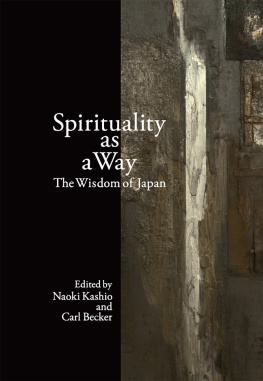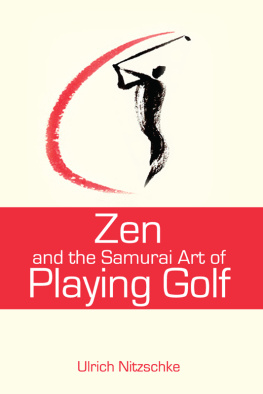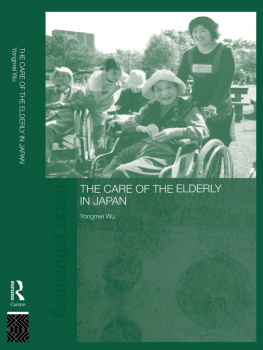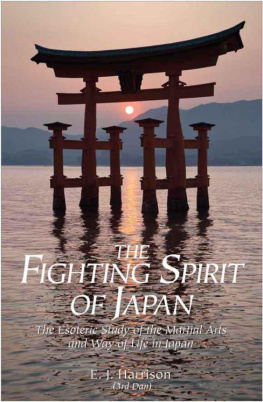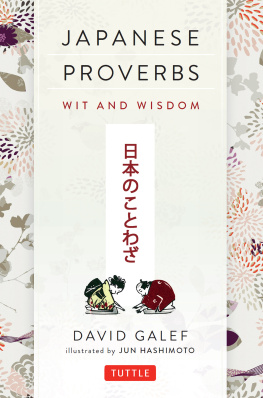Spirituality as a Way
Spirituality as a Way
The Wisdom of Japan
Edited by
Naoki Kashio
and
Carl Becker

First published in 2021 jointly by:
Kyoto University Press
69 Yoshida Konoe-cho
Sakyo-ku, Kyoto 606-8315, Japan
Telephone: +81-75-761-6182
Fax: +81-75-761-6190
Email:
Web: http://www.kyoto-up.or.jp
Trans Pacific Press Co., Ltd.
2nd Floor, Hamamatsu-cho Daiya Building
2-2-15 Hamamatsu-cho, Minato-ku, Tokyo
105-0013, Japan
Telephone: +81-50-5371-9475
Email:
Web: http://www.transpacificpress.com
Naoki Kashio and Carl Becker, 2021.
Edited by Miriam Riley, Armidale, Australia
Designed and set by Ryo Kuroda, New York, USA
Printed by Dai Nippon Printing Co., Ltd., Tokyo, Japan
Distributors
USA and Canada
Independent Publishers Group (IPG)
814 N. Franklin Street
Chicago, IL 60610, USA
Telephone inquiries: +1-312-337-0747
Order placement: 800-888-4741 (domestic only)
Fax: +1-312-337-5985
Email:
Web: http://www.ipgbook.com
Europe, Oceania, Middle East and Africa
EUROSPAN
Grays Inn House,
127 Clerkenwell Road
London, EC1R 5DB
United Kingdom
Telephone: +44-(0)20-7240-0856
Email:
Web: https://www.eurospangroup.com/
Japan
For purchase orders in Japan, please contact any distributor in Japan.
China
China Publishers Services Ltd.
718, 7/F., Fortune Commercial Building,
362 Sha Tsui Road, Tsuen Wan, N.T.
Hong Kong
Telephone: +852-2491-1436
Email:
Korea, Taiwan
MHM Ltd.
1-1-13-4F, Kanda-Jinbocho,
Chiyoda-ku, Tokyo 101-0051 JAPAN
Telephone: +81-(0)3-3518-9449
Email:
Southeast Asia
Alkem Company Pte Ltd.
1, Sunview Road #01-27,
Singapore 627615
Telephone: +65 6265 6666
Email:
All rights reserved. No reproduction of any part of this book may take place without the written permission of Kyoto University Press or Trans Pacific Press.
ISBN 978-1-925608-08-3 (ebook)
Contents
Figures
Tables
Photographs
Contributors
Carl BECKER
Editor
Professor at the Policy Science Unit, Kyoto University
He researches Japanese medical and environmental ethics, death and dying. He received honorary doctorates of Letters and Psychology from Bombay and Moscow, and awards from ADEC, SIETAR and the Crown Prince Akihito Foundation. Becker leads a national Japanese project investigating the effects of bereavement on productivity and medical costs, and serves on the editorial boards of numerous journals. Most of his books are in Japanese, but on spirituality, see Paranormal Experience and Survival of Death (SUNY Press, 1992), Buddhist Care for the Dying and Bereaved (J. Watts, Ed.) (Wisdom Pubs, 2012), and Spirituality, in Ten Have (Ed.), Encyclopedia of Global Bioethics (Springer, 2016).
Yoshihiro HAYASHI
Part-time Lecturer at Doshisha University
He specializes in philosophy of education and environmental ethics. His major publications include Toi toshiteno Spirituality (Spirituality as a Question) (Kyoto University Press, 2011); The Past as Eternally Imperishable, in Murata Yasuto (Ed.), Whitehead and Existentialism (Ky Shob, 2008, pp. 5972); Reconstructing the Meaning of Being Human: A Postmodern Reinterpretation of Frankl in the Framework of Whiteheads Philosophy, in George Derfer, Wang Zhihe and Michel Weber (Eds.), The Roar of Awakening: A Whiteheadian Dialogue between Western Psychotherapies and Eastern Worldviews (Ontos Verlag, 2009, pp. 159170); and Introducing a Time Horizon into Ethics, Process Studies, 39(1), 117125 (2011).
Naomi HIROTA
President of CREADIVA Co.
She specializes in career psychology and counseling studies. Her major publications include: Basic Research on Employment Support for Cancer Survivors in Career Counseling: Examining the Psychological Aspects of Cancer Survivors to Explore the Meaning of Working with Cancer, M-GTA Study Group News Letter, 99, 1531 (2019); Relationship between Marital Mood Swings, and Marital Relationship Satisfaction and Mental Health, 52nd Annual Conference Program of The Japanese Counseling Association, p. 48, (2019); and A Brilliant Womans Life: In Search of Beauty and Soul (Shunjsha, 2014).
Masayuki ITO
Professor at the Faculty of Letters, Aichi Gakuin University
He specializes in the sociology of religion, especially focusing on contemporary spirituality cultures including yoga, mindfulness and the Neo-Advaita movement. His major publications include: Spirituality in the Post-Secularization Era: Mindfulness Movement as a Clue, in Toji Kamata (Ed.), Course in Spiritual Studies Vol. 7, Spirituality and Religion (Being Net Press, 2016, pp. 176196); Modern Postural Yoga as a Spiritual Practice, in Naoki Kashio (Ed.), Spirituality and Culture (Keio University Press, 2012, pp. 117145); The Sociology of Spirituality, co-edited with Naoki Kashio and Tatsuya Yumiyama (Sekai Shisosha, 2004); Contemporary Societies and Spirituality: Sociological Study of Religious Consciousness (Keisui-sha, 2003); and New Spirituality in Contemporary Societies: A Comparative View on Japanese Spiritual World, in Harmut Zinser and Inken Prohl (Eds.), Zen, Reiki und Karate Japanische Religiositat in Deutschland (LIT Verlag, 2002, pp. 91108).
Takaaki David ITO
Professor of Spiritual Care at the Graduate School of Applied Religious Studies, Sophia University, Tokyo, Japan, and Chair of its Program in Death and Life Studies
He graduated from the International Christian University (BA) and its graduate school (MA), Tokyo, Japan, and completed his theological training at the Church Divinity School of the Pacific (Graduate Theological Union, MDiv), Berkeley, California, USA. Professor Ito is a founding member of the Japan Society for Spiritual Care and its clinical supervisor. He has served as the president of both the Asia-Pacific Council on Pastoral Care and Counselling and the International Council on Pastoral Care and Counselling. He was a visiting supervisor of Clinical Pastoral Education at Stanford Medical Center (200203). His primary mission is forming professionals of medicine, psychology, social work, education and public services, in the field of spiritual care.
Naoki KASHIO
Editor
Associate Professor at the Faculty of Letters, Keio University
He specializes in comparative meditation theory and meditation practices, especially internal alchemy. His major publications include: Linfluence de lesoterisme occidental sur les religions japonaises: theosophie, bouddhisme, nouvelles religions, Politica Hermetica, 26, pp. 1523 (2012); Legitimation de la pratique et de la pense des nouvelles religions au Japon: Lexemple de Skyo-Mahikari, in Anne Bouchy, Guillaume Carre, and Francois Lachaud (coordinator), Legitimites, legitimations: La construction de lautorit au Japon, Etudes thematiques 16, (Ecole francaise dExtreme-Orient, 2005, pp. 183197); The End of the Vitalistic Conception of Salvation: An Inquiry into Conceptual Validity in Modern Japanese New Religions, Religion and Society, 10, 6881, (2004); and Nouvelles voies spirituelles au Japon contemporain: tat des lieux et mutation de la religiosit, Archives de Sciences Sociales des Religions, 109, 6785, (2000) (with Jean-Pierre Berthon). Email:

